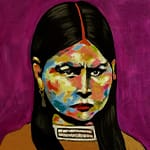Bad Indians Book Club

It's not about blood and it never has been. It's about how you arrive and build a relationship with the land you're on. And once you're there, it's also about how you receive others.
—Natalie Diaz (Mojave/Akimel/O'odham)
Other nations take these things into account, and in doing so they reinforce something we, with our fixation on blood, have forgotten: bending to a common purpose is more important than arising from a common place.
—David Treuer (White Earth Ojibwe)
This book started as a reading list that became a book club and then a series of panel discussions you can still catch on twitch. We wound up having about ten great conversations about how our worldview changes when we shift how we read, when we intentionally look to the margins for the writing and storytelling that is done there. We talked about history and science, gender and memoir, fiction and food autonomy. We talked about a thousand worlds opening up at our feet.
The concept of many worlds co-existing comes from the Zapatistas and I like it because I don't want a single just world that has to be imposed on everbody. Justice and autonomy will look different in different places ... that's what autonomy is. But we also aren't talking about ethnostates for everybody either because those aren't working out so well in the places where they do exist.Borders and boundaries just create a world of stateless people who don't belong anywhere at all. I'm interested in a world where many worlds can co-exist, where we don't interfere with each other and where we consider how our choices (to dam water for example) impact others before we thoughtlessly do the thing that benefits us.
From the introduction:
For millennia, people have moved and lived in ways that shared space without having to determine through blood or politics if you belonged. As Natalie Diaz says in the opening epigraph, it was never about blood. It was about how you arrive and build relationship; and then, having established yourself there, it is about how you welcome others as well. David Treuer reminds us that bending towards a common purpose is what makes a community. Our relatives matter, and the places where our ancestors became a people matter, because the land is my ancestor as surely as any of my human relatives are. But human ancestry is not the only relation that determines who we are and what we are building, and as Ta-Nehisi Coates says in his book to young writers, The Message, we must resist the temptation to find belonging by crafting our own narratives of conquest and all the borders and violence they require. Bad Indians know that we survive together, or not at all.
Bad Indians Book Club is a novena, of sorts: nine chapters of public prayer to Bad Indians and those like them who refused to be left in their special interest section. Bad Indians know that you learn best when you push aside the dust and detritus you have become accustomed to and make room for new ideas and new ways of thinking about things. Bad Indians take the life around us seriously, even when it is life we don’t understand. Bad Indians return to themselves through histories told by those who have a different stake in those stories. We are experts at refusal and creating hostile spaces, and we tell our own stories, even when they aren’t pretty. Bad Indians wield stories like weapons in the war against imagination. We pick medicine with the things that go bump in the night, and we know that we have a future despite everything that has been stolen, buried, and burned.
There is something defiant about being a Bad Indian, about leaning into these negative stereotypes. Something adolescent and feral. If I’m going to get into trouble anyway, I might as well deserve it. This book is, ultimately, a book about refusal: refusing political categories and the borders and violence that comes with them, refusing to assimilate by becoming the kind of person the state cannot assimilate. It’s written by a Bad Indian who doesn't just want to survive this current apocalypse. I want to join with others—Bad Indians and more—to midwife new worlds into being.

Bad Indians Book Club releases on September 16! Preorder your copy of Bad Indians Book Club today in the US at Bookshop.org, Amazon, Barnes and Noble, and in Canada: Indigenous owned GoodMinds, as well as Amazon, indie books, and Chapters Indigo. Get it wherever you get your books.
And if you want me to zoom into your local bookstore or bookclub? Talk with you on your podcast? I can do that. patty.krawec@gmail.com
For larger professional settings you can email Rob Firing at rob@transatlanticagency.com
September 16, 7pm St. Catharines Ontario: Finding Safety in a Colonial State at the Marilyn I Walker building with Dr. Robyn Bourgeois and Khadija Hammuda.
September 19, 7pm Toronto Ontario: Refusing Patriarchy at Roncesvalles United Church co-sponsored with Another Story Books, with Joy Henderson and Sean Carson Kinsella.
October 2, 7pm in Vancouver British Columbia: Indigenous Geographies with Dr. Deondre Smiles at Massy Books.
